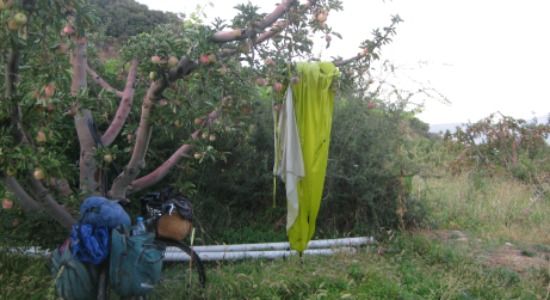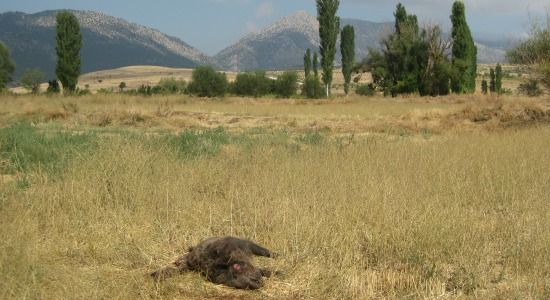Gandhi’s Wisdom Falls Short
Then, from behind me, came a staccato war cry—“Aaaack!”—as my host sent a boot into the dog’s rib cage
/https://tf-cmsv2-smithsonianmag-media.s3.amazonaws.com/filer/20111025113010Turkey-Sunlight-Explosion-Web2.jpg)
I always prefer sleeping under an open sky to the muggy captivity of tents, and only two things will drive me to set up my one-person North Face shack: mosquitoes or rain. As I entered the mountains surrounding Lake Egirdir it was plain that I’d be wrestling with tent poles that evening. The rocky peaks were mirrored by stacks of granite-gray thunderheads, and as night fell in the apple orchard where I camped, the stars vanished behind a ceiling of black and the downpour began. The storm crescendoed into a wild tempest as I snuggled into my sleeping bag. I opened my laptop to Microsoft Word and took a pull from my wine bottle—and my little house stayed as dry and cozy as a log cabin on Christmas.
On the beautiful, lonely west shore of Lake Burdur, a kindly couple in the village of Karakent took me in for breakfast. Everything—the cheese, the bread, the mulberry jam, the olives—was homemade. Afterward, the husband walked me out, and in the yard I stopped to meet their dog, a large sheepdog mix that smiled and wagged its tail when it discovered a friendly hand. Then, from behind me, came a staccato war cry—“Aaaack!”—as my host sent a boot into the dog’s rib cage. I immediately wondered about that famous quote from Gandhi: “The greatness of a nation and its moral progress can be judged by the way its animals are treated.” The moral progress of Turkey seems rather advanced if you’re a foreigner, but animals have it rough here.
Pigs, especially, take a beating. Though almost no one eats pork in Turkey because it’s considered offensively dirty, swine are pursued enthusiastically by gunmen. I’ve seen hunters prowling the roads carrying loaded rifles, and most nights I hear gunshots. To be fair, farmers whose fields have been ravaged by pigs have reason to despise the creatures. One afternoon I found a pig corpse posed in a display of blood and death throes, not a kilometer away from the outdoor market of Derekoy where, perhaps, its very killer gossiped and knocked on watermelons and tasted the fresh crop of walnuts—a nice man, I’m sure, but a hog-killer.
“Pig, hold still,” I said as I snapped a photo. “Your story will be told.”
I visit Pamukkale because, as a tourist, it’s my job. The place is crowded and teeming with tourists and buses, but it just takes five miles and 2000 vertical feet to put me in solitude again. It’s late when I reach a village called Uzulpinar Uzunpinar. I need a few items for dinner, so I pop into the village store. A man and woman watch from the doorway, and as I leave they say hello.

“Do you want dinner?” the man says. No, thanks, I answer, smiling gratefully while holding up the bag of produce. I add apologetically that it’s late and I must keep moving—but the man doesn’t hear it. He insists and coaxes me firmly down the street and through their doorway. They seat me in their kitchen as I continue to mutter my reluctance, and they serve me a bowl of chicken soup. The man sits with me and tears a piece of bread from a white loaf and dunks it into the pot to demonstrate. He chews with the grace of a caveman grubbing on bone marrow.
“Thanks, but I’m a vegetarian.”
He shakes his head and urges me on: “Eat!”
I know they mean well as hosts, but I panic, blurting out excuses. “But it’s Ramadan! I’m doing the master cleanse! I only eat mice!”
They finally seem to accept the reality that their guest isn’t hungry, and they free me. I camp beside a post-harvest vineyard (meaning I can sleep in). The sun sets. The sky turns gold. The stars convene overhead while in the east several miles off I see something I never have before: huge fiery explosions like those we know from action movies ballooning into the sky. Must be quarry work. The show lasts 15 minutes. Then I remember that this is pig country, with hunters a-prowl, and I stay low. Darkness lasts all night. The sun rises at dawn.
The shaking of the 7.2 earthquake did not affect the regions where I’ve traveled in Turkey. I had considered going to Lake Van or Batman after Cappadocia, to explore this Biblical region of huge mountains, mile-high valleys and exotic wildness. Hundreds have died, and looking at images of the disaster, I recognize the people. I know who they are. I know that they would have called to me and offered me tea and food and a ride over the next mountain pass—and then this earthquake buried them in rubble. And, knowing the generosity of the Turkish people, I imagine that some of them likely would have offered me a night in their homes.

/https://tf-cmsv2-smithsonianmag-media.s3.amazonaws.com/accounts/headshot/Off-Road-alastair-bland-240.jpg)
/https://tf-cmsv2-smithsonianmag-media.s3.amazonaws.com/accounts/headshot/Off-Road-alastair-bland-240.jpg)